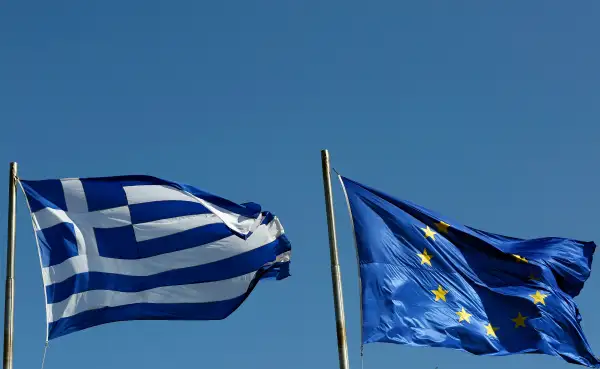What the Greek Crisis Means for Your Money
Money is not a client of any investment adviser featured on this page. The information provided on this page is for educational purposes only and is not intended as investment advice. Money does not offer advisory services.

As government officials in Greece and the rest of the European Union continue to haggle over the terms of its bailout agreement, you may be wondering: Does this have anything to do with me?
If you are investing in a retirement account like a 401(k) or an IRA, the answer is likely “yes.” About a third of holdings in a fairly typical target-date mutual fund, like Vanguard Target Retirement 2035, are in foreign stocks. Funds like this, which hold a mix of stocks and bonds, are popular choices in 401(k)s.
Of those foreign stocks, only a small number are Greek companies. Vanguard Total International Stock (which the 2035 fund holds), for example, has only about 0.1% of assets in Greek companies. But about 20% of the foreign holdings in a typical target date fund are in euro-member countries, and if Greece leaves the euro, that could affect the whole continent.
What’s the worst that could happen? For one, investors and citizens in some troubled economies like Spain and Italy could start pulling their euros out of banks. Also, borrowing costs could go up, and that could hurt economic growth and weigh down stock prices. And if fear of European instability drives investors to seek out safe assets like U.S. Treasuries, then bond yields and interest rates could keep staying at their unusually low levels.
There are some market watchers who see a potential upside to the conflict over Greece, however.
"If you believe the euro is an average of its currencies, it could actually rise if Greece leaves,” says BMO Private Bank chief investment officer Jack Ablin. A higher euro would make European stocks more valuable in dollar terms.
Additionally, he says, if Athens is thrown into pandemonium, then it’s actually less likely other countries will want to follow Greece out of the currency union.
The Greek situation will also have an impact on the bond market. If fear of European instability drives investors to seek out safe assets like U.S. Treasuries, then many bond funds will do well, and yields and interest rates would stay at their unusually low levels.
Perhaps the most insidious thing right now, says Ablin, is uncertainty. Again, a Greek exit from the euro would be unprecedented, and that makes the effect unpredictable—and potentially very scary for the global market. So investors would be wise to keep in mind the possibility of "black swans," a term coined by statistician Nassim Taleb to describe market events that seem unimaginable (like black swans used to be) until they actually occur.
Read next: What the Turmoil in Greece Means for Your Money

